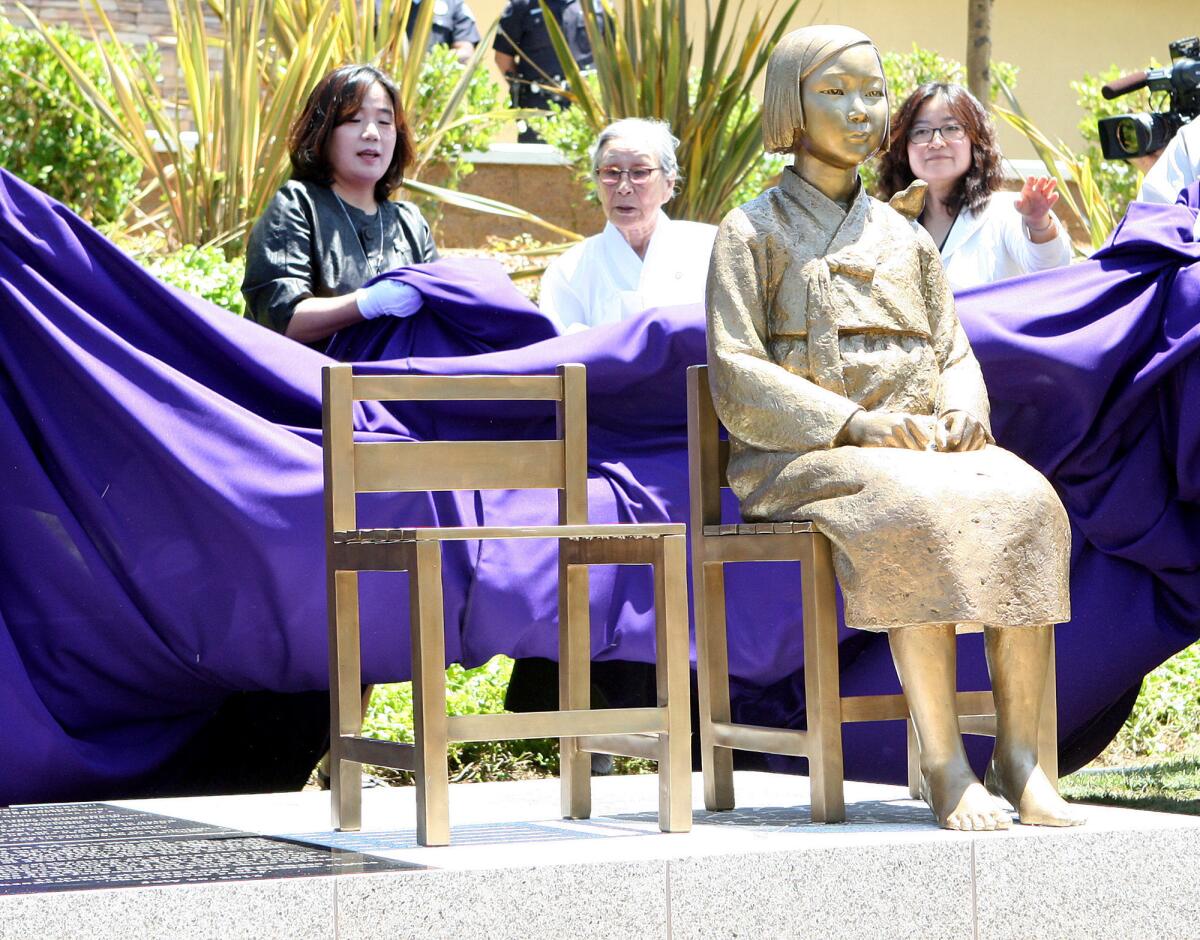Glendale’s Japan sister city deal may collapse

A Japanese city is considering dissolution of its sister-city relationship with Glendale, a move its officials say is unrelated to the installation of a controversial “comfort women” memorial, despite statements in the local media and a terse letter sent by its mayor decrying the decision.
The memorial, erected last month in Central Park and donated by the Korean Sister City Assn., honors women coerced into prostitution by the Japanese Imperial Army during World War II. Though generally accepted by historians, the issue remains controversial in the city of Higashiosaka, which is about 300 miles southeast of Tokyo, as well as the rest of Japan.
“[The statue] doesn’t matter,” said Rika Yomeda, chief of the cultural and international affairs division, through a translator by phone. She added that ending the 53-year-old relationship is just one of many options on the table.
But as Glendale prepared to install the monument, Higashiosaka’s mayor wrote an angry letter to city officials here.
“I find it an extremely deplorable situation and the people of Higashiosaka are hurt at a decision by your city to install a ‘comfort women’ statue,” Mayor Yoshikazu Noda wrote in a July 25 letter, just five days before Glendale unveiled the monument — the first such memorial on public land on the West Coast — before roughly 500 people in Central Park.
A few days after the ceremony, a leading Japanese news agency, Kyodo News International, reported that a senior Higashiosaka official “indicated the dispute may lead to the termination of the sister city relationship.”
The “comfort women” issue has been controversial for years as some Japanese deny that women were taken as sex slaves. Statue opponents, who contend the women willingly worked as army prostitutes, launched a letter-writing campaign that clogged Glendale inboxes with thousands of emails opposing the monument.
And nearly 100 statue opponents packed Glendale City Hall in early July when the Council approved installing the 1,100-pound statue.
While some women did work as prostitutes for soldiers, historians estimate that 200,000 women — some as young as 14 — from Korea, China, the Philippines and other countries were indeed taken as sex slaves.
Some were kidnapped while others were promised nursing jobs but found a different fate on the front lines.
The Japanese government’s position is that “comfort women” should not be a diplomatic or political issue because a former prime minister sent letters formally apologizing to former “comfort women” in the 1990s.
However, some Japanese politicians and residents still deny the coercion, which is partially why former “comfort women,” particularly from Korea, continue to demand an official resolution.
Yomeda said officials told the Japanese news agency that they have to think about the future of the sister city relationship but denied that the statue caused the rift. Rather, it’s been an ongoing discussion because the cities’ connections have grown cold over the past decade, she said.
“As no program has been exchanged with city of Glendale for some time, we have been discussing how the sister city relationship should be regardless of the incident this time,” she said.
Councilman Zareh Sinanyan, who supported the statue, said he didn’t want to lose the relationship with Higashiosaka but if officials there do pull away from Glendale, it will be seen in a bad light.
“I hope they don’t do it,” he said. “But if they do, no one’s going to believe, even if it may be true, that it was because [the relationship] was dormant.”
Glendale has several international partnerships formed through Sister Cities International, a nonprofit founded by former President Dwight Eisenhower that creates partnerships between U.S. and international communities.
Higashiosaka and Glendale forged a sister city relationship in 1960 and in 1974 the two cities jointly established the “Shoseian” Whispering Pine Teahouse & Friendship Garden in Brand Park.
But activities have gone stagnant. According to a Higashiosaka report on sister city exchanges, the last one took place in 2001.
While the relationship with Japan has dwindled, Glendale’s two Korean sister cities have ramped up cultural exchange efforts and four Korean “friendly cities,” which are similar to sister cities but are without the formal documentation, have been added to the mix.
The Korean Sister City. Assn. was the first sister city group to install a statue in Central Park, which Glendale officials envision as the future home for donations from other international communities.
Due to misunderstanding a Glendale report, Higashiosaka’s mayor thought his city was on the hook to cover a portion of the maintenance costs of the “comfort women” statue. However, Dan Bell, Glendale’s community relations coordinator, said its upkeep is the Korean association’s responsibility.
He also said that Glendale wants to revive its relationship with Higashiosaka.
“Let’s have a delegation come here. Let’s talk about what cultural exchange programs we can do. Our doors are open,” Bell said.
Korean advocacy groups have pledged to continue to erect more statues in the United States, but they hit a road block in the Southland in July when the majority of the Buena Park City Council opposed installing a “comfort women” monument there because they feared the controversy that would follow.
--
Follow Brittany Levine on Google+ and on Twitter: @brittanylevine.
ALSO:
Witnesses help lead to arrest of teen suspects in stabbing
Mario Lopez not fined for early start on Glendale home upgrades